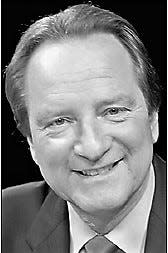America is not a 'Christian nation'
- Oops!Something went wrong.Please try again later.
- Oops!Something went wrong.Please try again later.
- Oops!Something went wrong.Please try again later.
- Oops!Something went wrong.Please try again later.
In a recent opinion column regarding how faith affects voting, an ACU professor observed that “some Christians feel bound to vote for Christian principles, Christian social positions or Christian candidates” - and that “most Christian folks have preferred their political leaders to be devout Christians, or at least to believe the right version of Christianity.”
More: Christians and public office: It's complicated
Though the professor is doubtlessly correct, he neglected to point out that such views would have been anathema to those who wrote our U.S. Constitution.
First, only some of the Founding Fathers (such as John Adams and Patrick Henry) were Christians.
A few, such as Ben Franklin and Thomas Paine, were atheists.

Many more, such as Thomas Jefferson, George Washington, James Madison and James Monroe, probably are best described as Deists.
But whatever their personal religious views, there is no doubt about the kind of republic they sought to create.
Setting forth the Constitution
In 1789 - after robust debate - the founders adopted a Constitution that not only makes no reference to God, Jesus, or the Bible, but also, under Article VI, specifically forbids religious tests of any kind for public office.
In 1797, the Senate (then still chock-full of founders) unanimously ratified the Treaty of Tripoli which flatly declared that “the Government of the United States of America is not in any sense founded on the Christian religion.”
And in his 1802 Letter to the Danbury Baptists, Thomas Jefferson explained why the Constitution erects a “wall of separation” between church and state.
That our government must be non-sectarian was widely accepted and rarely challenged for over 200 years.
In 1960, for example, it is unlikely that John F. Kennedy would have become America’s first Catholic president had he not given a speech to the Greater Houston Ministerial Association a few weeks before the election in which he emphatically declared “I believe in an America where the separation of church and state is absolute” ---and pledged to never allow his religious convictions to dictate his public policy positions.
But in recent years, the separation of church and state has come under assault; ironically, most often by Republicans who rarely miss a chance to trumpet their fidelity to the Constitution.
Some, like Trump Cabinet Secretary Ben Carson, have declared Muslims unfit to be president.
And less than a year ago, the first question Sen. Lindsey Graham (R-SC) asked of Supreme Court nominee Ketanji Brown Jackson during her confirmation hearing was, “What faith are you? On a scale of 1-10, how faithful would you say you are in terms of religion?”
It’s one thing to question candidates about their value systems and moral compasses.
It’s quite another to contravene Article VI of the Constitution by imposing de facto religious tests for public office.
So how should people of faith approach politics?
First, we must recognize that because politics is often about values — and because many people derive their values from their religious beliefs — it’s all but impossible to completely separate the two.
Yet, who among us can claim infallibility or to have a monopoly on truth?
Getting along in a pluralistic society requires that while all faiths are respected, none is enshrined — officially or otherwise — in our laws or government.
In practice, this means that on inherently personal issues where Americans are sharply divided (like abortion and Prohibition, for example) the proper role of religion is to appeal to the conscience of the individual, not the coercive power of the State.
Other issues with a moral dimension (such as civil rights or war and peace, for example) cannot be resolved by individuals, are inescapably public in nature, and must be addressed collectively by government action.
But in all cases, it’s important for believers to preserve the distinction between providing witness and offering counsel — and asserting that this or that political position is the “will of God.”
One does not compromise God’s will.
Yet compromise ---especially on contentious issues ---is the lifeblood of democracy. Without compromise, democracy cannot survive.
Second, we must resist the temptation to judge a candidate’s fitness for office by where or how often he or she worships — or even by whether they believe or disbelieve.
It is simply too slippery a slope ---as our nation’s history amply demonstrates.
In past eras, the targets of discrimination and political exclusion were Jews and Catholics — and in colonial Virginia, even Baptists.
Today’s targets might be Muslims or atheists.
Tomorrow’s targets could be — who knows?
Strictly separating church and state doesn’t mean sublimating moral principles in the in the exercise of political power.
It merely requires us to recognize that only through civility, tolerance, and a willingness to respect one another on matters of conscience can we adhere to the Constitution - and keep our country safe for both democracy and diversity.
Dale Butland served as press secretary and Ohio chief of staff for the late U.S. Sen. John Glenn. He is a 1970 graduate of Abilene Christian University
This article originally appeared on Abilene Reporter-News: America is not a 'Christian nation'